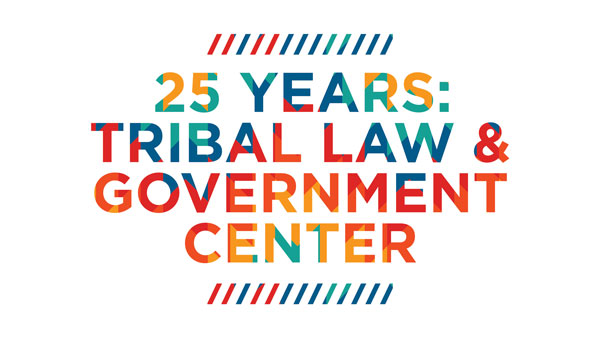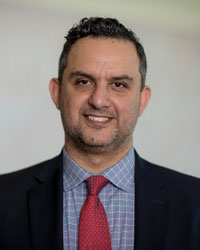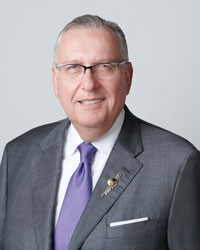25 Years: Tribal Law & Government Center

The Tribal Law & Government Center at the University of Kansas School of Law has been preparing students to represent Indigenous peoples and pursue careers in tribal law for over 25 years.
In that time, the program has established a strong reputation in the field. “The program produces some of the foremost leaders in Indian country,” said Elizabeth Kronk Warner, who served as the center’s director from 2012-2019.
The Tribal Law & Government Center celebrated 25 years of offering Indian law courses and programs during the 2020-2021 academic year. The center introduced its first course in fall 1995, shortly after Robert Porter helped establish the center and became its founding director.
Since then, more than 40 students have earned the Tribal Lawyer Certificate, with many more enrolling in classes or participating in the center’s programs.
These days, about 15-20 students are actively working on Indian law issues at any given time, interning with the Tribal Judicial Support Clinic, competing in the National Native American Law Students Association (NALSA) moot court competition, or participating in NALSA student organization activities, said Shawn Watts, current director of the Tribal Law & Government Center.
Through the Tribal Judicial Support Clinic, students work on research projects for tribal courts. Students also engage with tribal issues in federal court through field placement opportunities. In those settings, Watts emphasizes to students “that they’ve got to understand that they are working in a context with people who have a particularly distrustful relationship with the system that they’re encountering,” he said.
 Watts encourages students to “be mindful of not only the advocacy position they’re taking, but that they’re advocating their position in a way that affords dignity and respect,” including when students are advocating on the opposite side of a tribe.
Watts encourages students to “be mindful of not only the advocacy position they’re taking, but that they’re advocating their position in a way that affords dignity and respect,” including when students are advocating on the opposite side of a tribe.
That approach sets students up to be good practitioners when they enter the field, Watts said. In the past two years, much of that practice has happened remotely, as internship and clinic work moved online during the COVID-19 pandemic.
Students have worked directly with the Prairie Band Potawatomie Nation and the Navajo Nation. Others have conducted research related to McGirt v. Oklahoma, a 2020 United States Supreme Court decision that “changed how we thought of reservation boundaries,” Watts said.
Students during the spring 2020 semester had the opportunity to create training materials for diplomats on Indigenous issues and conflict resolution as part of a partnership between KU Law and the United Nations Institute for Training and Research. The work continued remotely as classes moved online for the last half of the spring 2020 semester.
That recent work is an extension of the Tribal Law & Government Center’s approach at its inception. At the outset, the center focused on the legal and governance issues facing Native American people at the tribal level — as opposed to law school programs that emphasized federal laws pertaining to tribes.
 Founding director Robert Porter came to that approach after four years working as attorney general for his own tribe, the Seneca Nation. At the time, there were few in-house attorneys working for tribal governments, with most work being handled by outside firms, Porter said.
Founding director Robert Porter came to that approach after four years working as attorney general for his own tribe, the Seneca Nation. At the time, there were few in-house attorneys working for tribal governments, with most work being handled by outside firms, Porter said.
“I thought then, as now, that there were efficiencies associated with having well-trained, in-house attorneys working directly with tribal officials without concern for billable hours and the related costs,” Porter said. “I’m glad to see that over 25 years later, many tribal nations have been able to embrace that approach to legal service delivery, hopefully for the good.”
The center aims to prepare students to be strong advocates with the skills necessary to appreciate and strengthen the unique nature of Indigenous tribal legal systems. A multi-faceted program that includes academic courses, clinic work, moot court competitions and student activities aids that preparation, said past director Kronk Warner.
“The center prepares students in multiple ways — from advocacy development and strong writing and research skill development through the moot court program to the opportunity to work directly with tribes through the clinical program,” Kronk Warner said. “The program gives students numerous skills and tools to be able to work creatively with tribes to find solutions to the unique challenges facing Indian country.”
In the past decade, KU Law teams have captured three national championship titles in the National Native American Law Students Association (NNALSA) Moot Court Competition. The program flourished during Kronk Warner’s directorship, with continued success under Watts. KU Law students have placed in the top three spots in six of the past seven years.
 “We had so many amazing students compete, and it was an honor to coach and support them,” Kronk Warner said of her time coaching KU’s NNALSA teams. “I have so many great memories from that time of students succeeding and growing. It didn’t hurt that we also brought home two national championships during that time.”
“We had so many amazing students compete, and it was an honor to coach and support them,” Kronk Warner said of her time coaching KU’s NNALSA teams. “I have so many great memories from that time of students succeeding and growing. It didn’t hurt that we also brought home two national championships during that time.”
A network of faculty and alumni coaches support the program’s continued success. The track record includes a national title at the 2021 virtual competition.
“We were able to maintain that success really as a testament to how hard the students worked, and how much they care, but also how much the rest of the KU faculty is invested in how NALSA does,” Watts said.
The experience students get digging into legal issues through the moot court program sets them up for success as they enter practice, Watts said. Combined with a skills focus in the classroom, students “arrive ready to be productive members of the team” who know how to apply the particular complications that come with Indian law to any broad area of law, Watts said.
Alumni of the Tribal Law & Government Center’s programs have gone on to hold positions as judges for tribal courts, prosecutors with tribal nations’ departments of justice and in-house council for tribes.
“I think KU Law has a great reputation in preparing students for working on behalf of tribal nations,” Porter said. “I couldn’t be more proud to have been a part of that success.”
Alumni News
An active group of tribal lawyers and scholars have trained at Green Hall in the past 25 years.
Sarah Deer, L’99, is a University Distinguished Professor at the University of Kansas. A citizen of the Muscogee (Creek) Nation, Deer is a leading expert on gender-based violence in Native American communities. Her work has earned her several distinguished awards, including a MacArthur Fellowship in 2014, induction into the National Women’s Hall of Fame in 2019, and membership in the 2020 class of Andrew Carnegie Fellows.
Zachariah Pahmahmie, L’01, serves as vice chair of the Prairie Band Potawatomi Tribal Council.
Mekko Tyner, L’04, is dean of academic affairs at the College of the Muscogee Nation.
Elizabeth Cook, L’06, is a senior staff attorney for the Nottawaseppi Huron Band of the Potawatomi.
Yonne Tiger, L’06, is co-founder of Campbell Tiger, PLLC. Tiger is also an adjunct instructor for the College of the Muscogee Nation, teaching Gaming Law. She was previously assistant attorney general for the Muscogee (Creek) Nation Department of Justice.
Eugenia Charles-Newton, L’08, is a prosecutor for the Navajo Nation Department of Justice, as well as a council delegate and chairwoman of the Law & Order Committee for the Navajo Nation.
Tracie Revis, L’10, is chief of staff for the Muscogee (Creek) Nation.
Hon. Layatalati Hill, L’12, is chief trial court judge for the Oneida Judiciary, working with the Oneida Nation of Wisconsin. Hill also serves as secretary-treasurer for the board of directors of the National American Indian Court Judges Association.
Leslie Shannon Swimmer, L’13, recently completed a four-year term as an associate judge for the Eastern Band of the Cherokee Nation.
Rebecca Howlett, L’14, is a tribal relations consultant with Howell & Howlett Consulting.
Aidan Graybill, L’21, is a member of the 2021 class of Justice Catalyst fellows. In a joint fellowship with the Public Rights Project, Graybill is addressing predatory student lending affecting Navajo Nation citizens while working with the Navajo Nation Department of Justice.
TLGC Program Components
The Tribal Lawyer Certificate ensures students aspiring to a career representing Indian nations have the skills necessary to appreciate and strengthen the unique nature of Indigenous tribal legal systems.
The Tribal Judicial Support Clinic gives second- and third-year law students the opportunity to assist tribal court systems through a variety of projects.
A JD/MA in Indigenous Studies joint degree program allows students to obtain both degrees on an accelerated basis, preparing them to become leaders and policymakers in Indigenous communities worldwide.
The Tribal Law & Government Conference highlights how work addressing the emerging and historical problems of Indigenous law and governance are critical to strengthening tribal sovereignty.
KU’s Native American Law Students Association (NALSA) coordinates annual service projects and social events. The NNALSA Moot Court Competition tests students’ knowledge of Indian law by evaluating their legal writing and oral advocacy skills.
Center Timeline
- August 1995: Robert Porter hired as the founding director of the Tribal Law & Government Center. Porter now runs his own federal government relations and lobbying firm representing Indian nations.
- Fall 1995: The Tribal Law & Government Center offers its first class.
- Spring 1996: KU Law wins its first NNALSA Moot Court championship.
- 2002-2012: Stacy Leeds serves as center director. Leeds is now Foundation Professor of Law and Leadership at the Sandra Day O’Connor College of Law, Arizona State University. She was previously dean of the University of Arkansas School of Law and was the first Indigenous woman to lead a law school.
- 2012-2019: Elizabeth Kronk Warner serves as center director. Kronk Warner is now dean and professor of law at the University of Utah.
- 2019-2021: Shawn Watts serves as center director, after joining the KU Law faculty in 2018. A citizen of the Cherokee Nation of Oklahoma, Watts is also a district court judge for the Prairie Band Potawatomi Nation.
This article appeared in print in the 2021 KU Law Magazine.